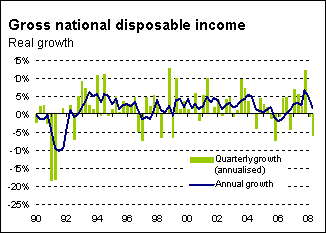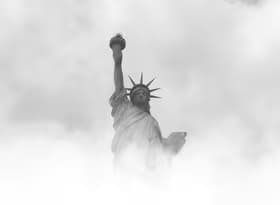How can such a small tumble hurt so much?
It’s official – New Zealand experienced its first recession in a decade over the first half of 2008. According to the official statistics the quarterly level of economic activity is down 0.5% on its peak in December (adjusted for seasonal differences).
However, over this period New Zealand has experienced a severe drought, a sharp increase in petrol prices, and a significant increase in the cost of getting credit – a series of events that has been compared to the 1991 recession, and even the Great Depression. This begs the question: why has measured economic activity "only" fallen 0.5% when, to many of us, the decline feels much greater?
This point has been illustrated by the Westpac Consumer Confidence survey, which fell to its lowest level since the 1991 recession in June. The decline in confidence far exceeded anything seen during the Asian Crisis or the bursting of the dot com bubble, when larger declines in GDP were recorded.
One factor that may explain this difference is population growth. If New Zealand experienced a big increase in our population then the amount produced in the economy (GDP) may rise, even if everyone in the county is becoming poorer. Taking this into account tells us that economic activity per person is down 0.9% since December.
However, this is smaller than the decline over the second half of 1997, when the initial shock of the Asian Financial Crisis dragged economic activity per person down 1.1% per person.
An alternative way of looking at the national economic position is to look at real gross national disposable income (RGNDI). As well as taking into account domestic production, this measure captures the impact of the price of exports and imports, as well as international income flows, on our nation’s income position.
In other words it tells us what we can buy rather than how much we make.
The RGNDI measure declined by 1.3% in the June quarter as petrol prices rose and the profitability of New Zealand firms’ activities overseas fell. When we look at RGNDI in per person terms the decline in income appears even greater, with a 1.7% fall recorded since December. This is significantly worse than the start of the Asian Financial Crisis, when RGNDI actually rose 1.9%.
Even so, compared to some other episodes of slowing growth, this fall in income is relatively small. As recently as the second half of 2005, RGNDI per person fell 2.4% per person over the nine months to March 2006.
Furthermore, both of these declines pale in comparison to the 10% fall in income recorded during New Zealand’s last major recession over the nine months to June 1991.
The reason that the current situation feels so much worse than late 2005, and many other periods of negative national income growth, stems from the fact that it coincides with a substantial decline in asset prices – specifically house values.
The 4.5% annual decline in house prices experienced over the three months to August was the largest nominal decline in the value of property on record. When the sharp decline in asset prices is combined with a rapid fall in national real income it is understandable why this recession has felt more painful than our headline GDP number suggests.
All in all, the decline in New Zealander’s wealth and income over the first half of 2008 has been substantial, and this has led some commentators to state that we are now in a terrible economic situation – an attitude that exaggerates the severity of our situation.
Looking at a longer term context, the price of what we sell overseas, relative to the price of what we buy, has gone through the roof, hitting a 34 year high in March. This shift pushed RGNDI per person over the 2007 year up 3.8% on 2006 – the largest increase since the economic boom times of 2004.
As a result, even with the decline in RGNDI over the first half of the year, our income as a nation is still higher than at any time prior to September 2007.
Furthermore, house prices increased by an average of 14%pa between 2002 and 2007 (or a cumulative 68%), indicating that the possibility of a 30% decline over the next five years would simply see household’s lose some of the extravagant wealth gains that they have been gifted by rising house prices.
In reality, the decline in activity feels so intense because the recent increase in income and house prices has been similarly rapid. New Zealander’s may not be as rich as they thought they were last year, but as a nation we are still in a much better position than we would have expected five years ago.





